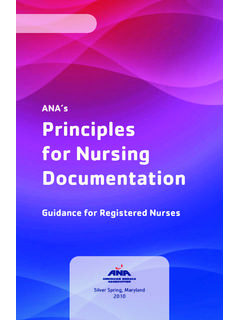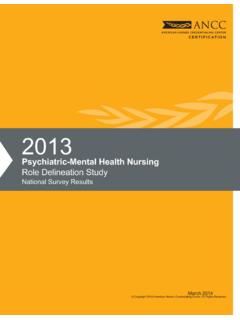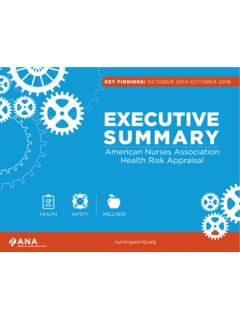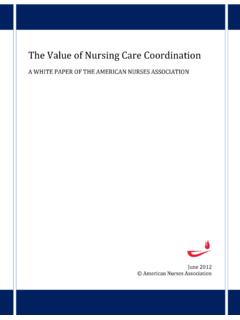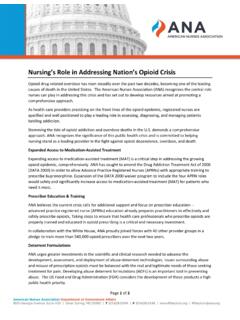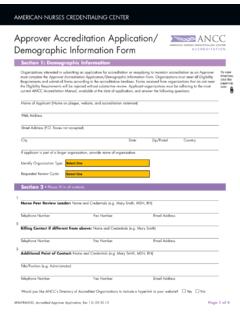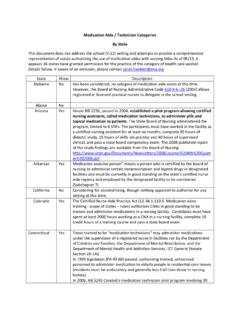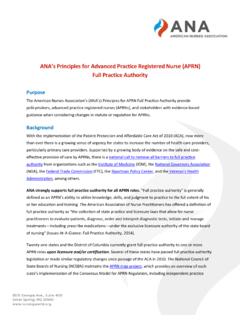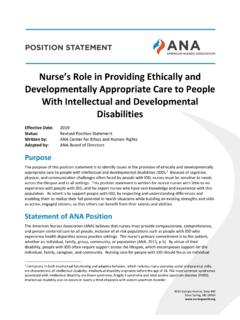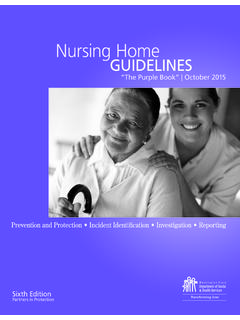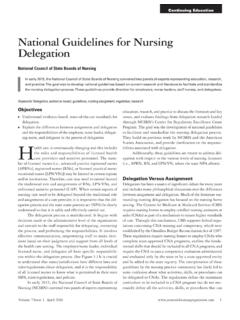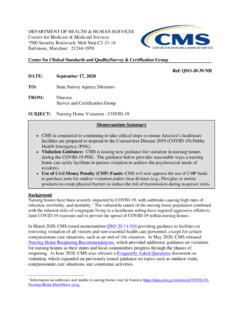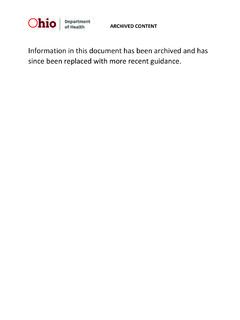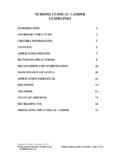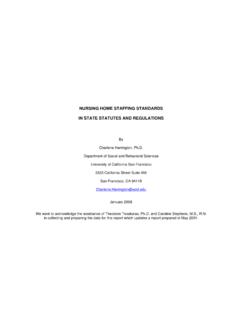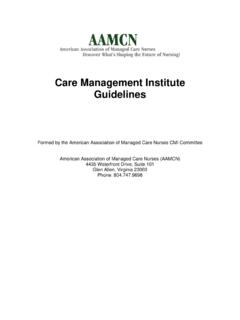Transcription of National Guidelines for Nursing Delegation
1 National Guidelines for Nursing Delegation Effective Date: 04/01/2019 Status: Replaces ANA 2010 Written by: ANA NCSBN Jointly Adopted by: ANA Board of Directors / NCSBN Board of Directors I. Purpose Delegation is an essential Nursing skill. Building on previous work of National Council of State Boards of Nursing (NCSBN) and the American Nurses Association (ANA), this joint statement reflects an effort to standardize the Nursing Delegation process based on research findings and evidence in the literature and is applicable to all levels of Nursing licensure (advanced practice registered nurse [APRN], registered nurse [RN], licensed practical/vocational nurse [LPN/VN]) where the nurse practice act (NPA) is silent. These Guidelines can be applied to: APRNs when delegating to RNs, LPN/VNs and assistive personnel (AP) RNs when delegating to LPN/VNs and AP LPN/VNs (as allowed by their state/jurisdiction) when delegating to AP.
2 Note: These Guidelines do not apply to the transfer of responsibility for care of a patient between licensed health care providers ( , RN to another RN or LPN/VN to another LPN/VN), which is considered a handoff (Agency for Healthcare Research and Quality, 2015). Introduction Health care is continuously changing and necessitates adjustment for evolving roles and responsibilities of licensed health care providers and assistive personnel. The abilities to delegate, assign and supervise are critical competencies for every RN. It is important to note that states/jurisdictions have different laws and rules/regulations about Delegation , and it is the responsibility of all licensed nurses to know what is permitted in their state. When certain Nursing care needs to be delegated, it is imperative that the Delegation process and the state NPA be clearly understood so that it is safely, ethically and effectively carried out.
3 The decision of whether or not to delegate or assign is based upon the RN s judgement concerning the condition of the patient, the competence of all members of the Nursing team and the degree of supervision that will be required of the RN if a task is delegated. The difference between Delegation and assignment has been a source of debate for years. Page 2 of 10 Definitions Accountability: To be answerable to oneself and others for one s own choices, decisions and actions as measured against a (American Nurses Association, 2015, p. 41). Delegated Responsibility: A Nursing activity, skill or procedure that is transferred from a licensed nurse to a delegatee. Delegatee: One who is delegated a Nursing responsibility by either an APRN, RN or LPN/VN (where states NPA allows), is competent to perform it and verbally accepts the responsibility. A delegatee may be an RN, LPN/VN or AP.
4 Delegator: One who delegates a Nursing responsibility. A delegator may be APRN, RN, or LPN/VN (where state NPA allows). Assignment: The routine care, activities and procedures that are within the authorized scope of practice of the RN or LPN/VN or part of the routine functions of the AP. Licensed Nurse: A licensed nurse includes APRNs, RNs and LPN/VNs. In some states/jurisdictions, LPN/ VNs may be allowed to delegate. Assistive Personnel (AP): Any assistive personnel trained to function in a supportive role, regardless of title, to whom a Nursing responsibility may be delegated. This includes but is not limited to certified Nursing assistants or aides (CNAs), patient care technicians, CMAs, certified medication aids, and home health aides (formerly referred to as unlicensed assistive personnel [UAP]). When performing a fundamental skill on the job, the delegatee is considered to be carrying out an assignment.
5 The routine care, activities and procedures assigned are those which would have been included in the delegatee s basic educational program. A licensed nurse is still responsible for ensuring an assignment is carried out completely and correctly. Delegation is allowing a delegatee to perform a specific Nursing activity, skill, or procedure that is beyond the delegatee s traditional role and not routinely performed. This applies to licensed nurses as well as AP. Regardless of the current role of the delegatee (RN, LPN/ VN or AP), Delegation can be summarized as follows: A delegatee is allowed to perform a specific Nursing activity, skill or procedure that is outside the traditional role and basic responsibilities of the delegatee s current job. The delegatee has obtained the additional education and training, and validated competence to perform the care/delegated responsibility.
6 The context and processes associated with competency validation will be different for each activity, skill or procedure being delegated. Competency validation should be specific to the knowledge and skill needed to safely perform the delegated responsibility as well as to the level of practitioner ( , RN, LPN/VN, AP) to whom the activity, skill or procedure has been delegated. The licensed nurse who delegates the responsibility maintains overall accountability for the patient. However, the delegatee bears the responsibility for the delegated activity, skill or procedure. Page 3 of 10 The licensed nurse cannot delegate Nursing judgment or any activity that will involve Nursing judgment or critical decision making. Nursing responsibilities are delegated by someone who has the authority to delegate. The delegated responsibility is within the delegator s scope of practice.
7 When delegating to a licensed nurse, the delegated responsibility must be within the parameters of the delegatee s authorized scope of practice under the NPA. Regardless of how the state/jurisdiction defines Delegation , as compared to assignment, appropriate Delegation allows for transition of a responsibility in a safe and consistent manner. Clinical reasoning, Nursing judgement and critical decision making cannot be delegated. The Delegation process is multifaceted. It begins with the administrative level of the organization including: determining Nursing responsibilities that can be delegated, to whom, and what circumstances; developing Delegation policies and procedures; periodically evaluating Delegation processes; promoting positive culture/ work environment. Then the licensed nurse must be responsible for determining patient needs and when to delegate, ensure availability to delegate, evaluate outcomes of and maintain accountability for delegated responsibility.
8 Finally, the delegatee must accept activities based on their competency level, maintain competence for delegated responsibility and maintain accountability for delegated activity. Page 4 of 10 Five Rights of Delegation Right task: The activity falls within the delegatee s job description or is included as part of the established written policies and procedures of the Nursing practice setting. The facility needs to ensure the policies and procedures describe the expectations and limits of the activity and provide any necessary competency training. Right circumstance: The health condition of the patient must be stable. If the patient s condition changes, the delegatee must communicate this to the licensed nurse, and the licensed nurse must reassess the situation and the appropriateness of the Delegation . Right person: The licensed nurse along with the employer and the delegatee is responsible for ensuring that the delegatee possesses the appropriate skills and knowledge to perform the activity.
9 Right directions and communication: Each Delegation situation should be specific to the patient, the licensed nurse and the delegatee. The licensed nurse is expected to communicate specific instructions for the delegated activity to the delegatee; the delegatee, as part of two-way communication, should ask any clarifying questions. This communication includes any data that need to be collected, the method for collecting the data, the time frame for reporting the results to the licensed nurse, and additional information pertinent to the situation. The delegatee must understand the terms of the Delegation and must agree to accept the delegated activity. The licensed nurse should ensure that the delegatee understands that she or he cannot make any decisions or modifications in carrying out the activity without first consulting the licensed nurse. Right supervision and evaluation: The licensed nurse is responsible for monitoring the delegated activity, following up with the delegatee at the completion of the activity, and evaluating patient outcomes.
10 The delegatee is responsible for communicating patient information to the licensed nurse during the Delegation situation. The licensed nurse should be ready and available to intervene as necessary. The licensed nurse should ensure appropriate documentation of the activity is completed. Source: NCSBN. (1995, 1996) Page 5 of 10 Guidelines for Delegation Employer/Nurse Leader Responsibilities 1. The employer must identify a nurse leader responsible for oversight of delegated responsibilities for the facility. If there is only one licensed nurse within the practice setting, that licensed nurse must be responsible for oversight of delegated responsibilities for the facility. Rationale: The nurse leader has the ability to assess the needs of the facility, understand the type of knowledge and skill needed to perform a specific Nursing responsibility, and be accountable for maintaining a safe environment for patients.
